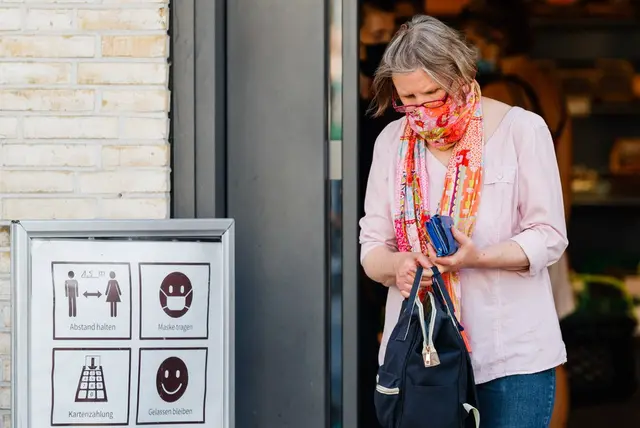A woman wearing a face covering leaves a shop in Berlin, capital of Germany, on June 18, 2020. (Photo by Binh Truong/Xinhua)
Germany imposed new lockdowns for two districts in the state of North Rhine-Westphalia. The move came after a coronavirus outbreak at a slaughterhouse that has infected more than 1,550 workers.
BERLIN, June 23 (Xinhua) -- Following a COVID-19 outbreak at Germany's largest meat processing company Toennies, public life in the district of Guetersloh and its neighboring district of Warendorf would again be severely restricted, Karl-Josef Laumann, health minister of North Rhine-Westphalia (NRW) announced on Tuesday.
For the coming week, local residents are only allowed to move around in public spaces with members of their own household or in pairs. In addition, museums, cinemas, fitness studios, indoor swimming pools and bars will be closed. From Thursday, the district of Warendorf will also close all schools and day-care centers, which now are already closed in Guetersloh.
More than 1,550 employees of Toennies were infected with COVID-19, according to city officials. Around 7,000 employees of the company had to undergo quarantine.

Passengers wait to get on a train to Prague of the Czech Republic at Berlin Central Train Station in Berlin, capital of Germany, June 15, 2020. (Photo by Binh Truong/Xinhua)
The reimposed lockdown would initially apply until June 30 and would "provide more clarity," said Armin Laschet, minister-president of NRW, on the same day.
According to the Robert Koch Institute (RKI), local COVID-19 outbreaks such as in the district of Guetersloh were causing Germany's nationwide figures to rise.
In recent weeks, new daily cases had averaged at around 350 but the RKI announced on Tuesday that new infections with COVID-19 in Germany increased by 503 within one day to 190,862.
The critical reproduction rate of R0, which indicates how many people one infected person is infecting, stood at 2.76, according to the RKI daily situation report for Monday. For the past weeks, however, the rate in Germany had already been below one.
"We must continue to be careful," said RKI President Lothar Wieler on Tuesday. "If we give the virus the chance to spread, it will take that chance." ■
 简体中文
简体中文



